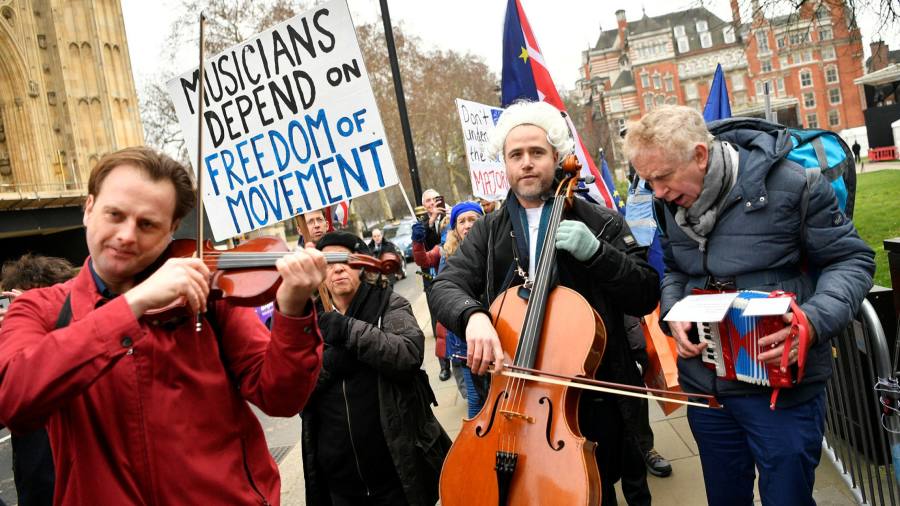[ad_1]
A UK minister admitted on Tuesday that the government had so far failed to open talks with EU countries to ease the plight of music, fashion, acting and other creative industries hit by post-Brexit bureaucracy.
The admission came amid growing calls from the UK’s £111bn creative sector for the government to negotiate better access to work in the EU, after it became clear that the new trade deal between the EU and UK failed to include any special arrangements for musicians and other creatives.
Despite agreeing a zero tariff, zero quota agreement just before Christmas, a number of UK industries and businesses have been battling with a wave of new red tape and customs and visa requirements in the six weeks since the UK-EU deal came into force.
MPs were told by industry experts on Tuesday that the latest Covid-19 travel restrictions had created a four-month window in which to try to reduce visa and work-permit restrictions for creatives who would normally work in the bloc. The sector has reported that actors and musicians were already losing jobs because they held UK passports.
However Caroline Dinenage, the culture and digital minister, admitted to MPs that while the government wanted to use “all the diplomatic tools†to help the industry, both bilateral negotiations and an EU-wide solution would be “very difficultâ€.
Dinenage said there were no current formal negotiations taking place through the department for digital, culture, media and sport, but officials added that discussions were under way to discuss which member states to prioritise, with talks promised “very shortlyâ€.Â
However, the minister said that while she was keen to open conversations with EU members states on this issue, she warned bilateral agreements would not necessarily be straightforward.Â
“Clearly bilateral agreements are very difficult because of international law and guidance, that on the whole they have to make agreements that work for every other country round the world,†she explained.
In recent weeks creative industry chiefs have warned the new UK-EU trade deal — which does not include a bilateral visa-waiver agreement or a list of exemptions for creative and other service industry providers that previously enjoyed easy access to EU markets — risks decimating their industry, hitting younger artists hardest.
The UK Fashion Roundtable, which wrote to the prime minister two weeks ago raising many similar issues in a letter co-signed by 400 industry figures including models Twiggy and Yasmin Le Bon, said on Tuesday that it was still waiting for a reply from the government.
Deborah Annetts, chief executive of the Incorporated Society of Musicians warned that continuing uncertainty had created a huge emotional and financial toll on musicians, with visas for a single performance in Spain or Italy costing £600 and £500 respectively.Â
Speaking to the committee on Tuesday, Annetts said there was a “real crisis†among the musician community and that some individuals had even been sacked by orchestras on the continent because they did not hold a European passport.
“Many of them (musicians) talk about how they have had to make a choice between being a musician and their nationality, about how their entire cultural identity has been lostâ€, she added.Â
Annetts also argued that department for business, energy & industrial strategy (BEIS) greatly misunderstood the sector, adding: “They are incompetent and I know that is a terrible thing to say but from what I have seen of some of the work coming out of BEIS it has not been of a high enough standard when people’s livelihoods are dependent on their work.â€
The demands for action from the music industry were echoed by the acting fraternity which said that the post-Brexit trading arrangements with the EU represented a “towering hurdle†to the profession.
In an open letter to the prime minister issued by the acting union, Equity, they urged the government to negotiate reciprocal visa-free travel for creative industries with the bloc.
The signatories, including Patrick Stewart, Ian McKellen and Ricky Tomlinson, warned that British actors were already losing jobs to EU actors because of the costs of the new bureaucracy, with job-advertisements specifying EU passport holders only.
“Before, we were able to travel to Europe visa-free. Now we have to pay hundreds of pounds, fill in form after form, and spend weeks waiting for approval — just so we can do our jobs,†they wrote.Â
[ad_2]
Source link






